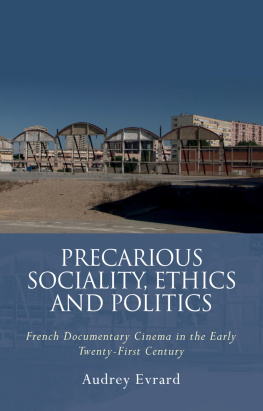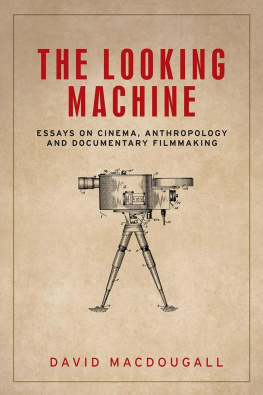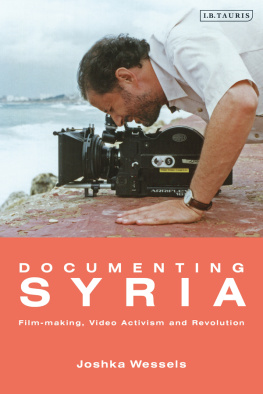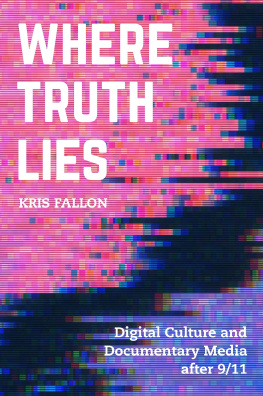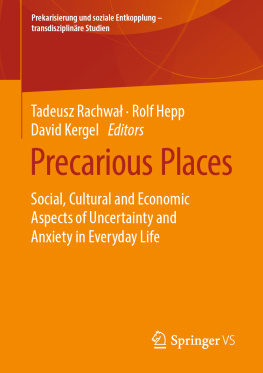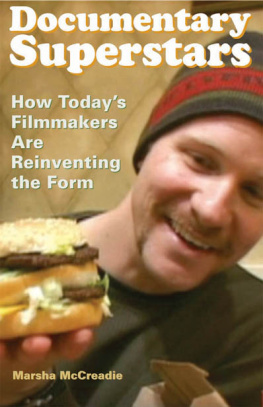Concluding remarks
In 2000, Jean-Louis Comolli described the impossible challenge of filming workers bodies (les corps ouvriers) brought to the point of exhaustion, while simultaneously casting this crisis of presence, speech, listening as a new political project for the future to come. How film-makers have explored and occupied that gap in the past two decades has been the main focus of this study. The evanescence of working-class bodies and the political solidarities they embodied has been shown to be a new starting point rather than the end of documentary cinemas political projects.
Across this book, I have argued that, in the early decades of this century, French documentary film-makers have re-engaged the political from the standpoint of an ethical inquiry. The connections between the chapters and the socio-political context of precarity have occasionally been tangential. Yet, I argue that, by returning to solidarity, sociality and community as processes to be engaged with through scalable and careful social, political, aesthetic and ethical experiments, they have engaged the double crisis induced by precarity and precarisation: the crisis of the collective and the existential crisis of the social subject. Across the chapters, identities have been shown to come undone, filiations reimagined and minimal communities of all sorts provisionally assembled. At times, they have troubled the film archive to retrieve unrealised filiations; at other times, they have directly confounded the viewer.
From a mutual bond within a given social group or community (such as class-based solidarity), the films of the corpus advance a democratic notion of solidarity, one that, to use Olivier Marcharts words, registers an ethical demand for self-alienation for de-grounding ones own identity and translates it into the language of political demand.
This work and mine, as a result, focus on the specific demands that each voice extends, allowing the different scenes (labour struggles, work dreams, rural life, post-industrial valleys, housing estates) included in the corpus and in each chapter to be both distinct and resonant with one another. The precarious subjectivities encountered are not presumed to be equal; precarity is understood to involve different social positionings, each subject to individual and collective inflexions. There is no precariat figured in this book, neither is it assumed as the goal of French documentarys political project.
Endnotes
Introduction
Guillaume Le Blanc, Vies ordinaires, vies prcaires (Paris: Editions Seuil, 2007), p. 13, This book was inspired by the oppressive, suffocating nature of our present times and the anger that boils up as we helplessly witness the precarisation of ordinary lives, summoned to justify precarity with new ideologies.
(last accessed 15 July 2021): La lutte contre les exclusions est un impratif national fond sur le respect de lgale dignit de tous les tres humains et une priorit de lensemble des politiques publiques de la nation. La prsente loi tend garantir sur lensemble du territoire laccs effectif de tous aux droits fondamentaux dans les domaines de lemploi, du logement, de la protection de la sant, de la justice, de lducation, de la formation et de la culture, de la protection de la famille et de lenfance. For further details, see Sophie Dion-Loye, La loi dorientation relative la lutte contre les exclusions du 29 juillet 1998, Le Genre Humain, 2/389 (2002), 11330.
The emergence of new forms of social movements in France has been the subject of numerous publications, including Sarah Waters, Social Movements in France: Towards a New Citizenship (London: Palgrave Macmillan, 2003); Jeremy F. Lane, Bourdieus Politics: Problems and Possibilities (London: Routledge, 2007); Graeme Hayes and Martin OShaughnessy, Cinma et engagement (Paris: LHarmattan, 2005).
(last accessed 16 July 2021).
, Il y a effectivement quelque chose dirrespectueux dranger les gens dans leur moderne solitude, ce sentiment o le bien-tre ouat se mle une irrpressible envie de pleurer. Otzenberger drange [] Drangeant, en effet, car subitement, les passants ne sont plus ces petites particules danonymat fichues dun flou de cinma ou de stries vido, non, ils sincarnent au contact du cinaste qui, volontairement, les choque et rclame deux quils fournissent un avis, du discours [] A contrario, les sans-logis, les galriens du quotidien, les noys en sursis bnficieraient dun rgime dcoute a priori favorable: je pose la camra, prends ton temps, je tcoute (link no longer available 2 July 2021).
Bill Nichols, Representing Reality: Issues and Concepts in Documentary (Bloomington: Indiana University Press, 1992), p. 178.
Judith Butler, Precarious Life: The Powers of Mourning and Violence (London and New York: Verso, 2004), p. 49, I cannot muster the we except by finding the way in which I am tied to you, by trying to translate but finding that my own language must break up and yield if I am to know you. You are what I gain through this disorientation and loss. This is how the human comes into being, again and again, as that which we have yet to know.
Lisa Downing and Libby Saxton, Film and Ethics: Foreclosed Encounters (London: Routledge, 2009), p. 93.
Pierre Bourdieu, Job Insecurity is Now Everywhere, Acts of Resistance: Against the Tyranny of the Market (New York: The New Press, 1998), pp. 817, p. 85.
(last accessed 2 July 2021).
Lorey, State of Insecurity, p. 12.
Lorey, State of Insecurity, pp. 1315.
Lorey, State of Insecurity, pp. 1213.
(last accessed 2 July 2021).
Christophe Dejours, Alienation and the Psychodynamics of Work, XVI.
, Que faut-il entendre par prcarit subjective? Cest le sentiment de ntre pas chez soi dans son travail, de ne pas pouvoir se fier ses routines professionnelles, ses rseaux, aux savoirs et savoir faire accumuls grce lexprience ou transmis par les plus anciens; cest le sentiment de ne pas matriser son travail, et de devoir sans cesse dvelopper des efforts pour sadapter, pour remplir les objectifs fixs, pour ne pas se mettre en danger ni physiquement, ni moralement. Cest le sentiment de ne pas avoir recours en cas de problmes graves de travail, ni du ct de la hirarchie (de plus en plus rare et de moins en moins disponibles), ni du ct des collectifs de travail qui se sont effilochs avec lindividualisation systmatique de la gestion des salaris et leur mise en concurrence. Cest ainsi le sentiment disolement et dabandon. Cest aussi la perte de lestime de soi, qui est en lien avec le sentiment de mal matriser son travail, avec le sentiment de ne pas tre la hauteur de son travail, de faire du mauvais travail, de ne pas tre sr dassumer son poste. Et cela parce que le management moderne impose, au nom de lautonomie et de la responsabilisation, tous les salaris de grer les multiples dysfonctions dorganisations du travail dfaillantes, (cest--dire qui ne leur donne pas les ressources ncessaires pour affronter les exigences de leur travail) toute en intensifiant de faon spectaculaire les rythmes de travail (last accessed 30 June 2021).
Jasbir Puar (ed.), Precarity Talk: A Virtual Roundtable with Lauren Berlant, Judith Butler, Bojana Cvejic, Isabell Lorey, Jasbir Puar, and Ana Vujanovic, TDR: The Drama Review, 56/4 (Winter 2012), 16377, 172.
Precarity Talk: A Virtual Roundtable with Lauren Berlant, Judith Butler, Bojana Cvejic, Isabell Lorey, Jasbir Puar, and Ana Vujanovic, 1723.
(last accessed 30 June 2021).
(last accessed 17 May 2021). They also co-authored

